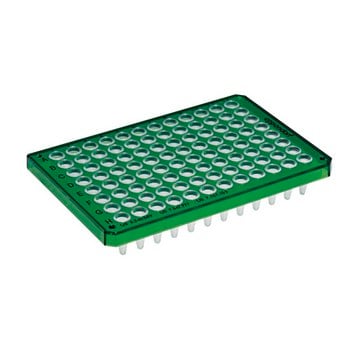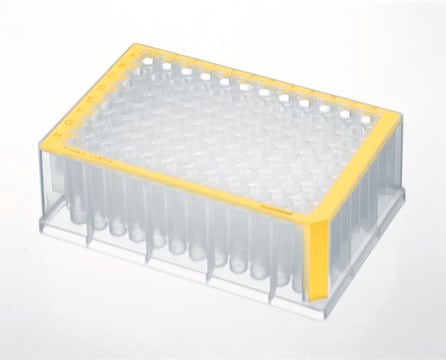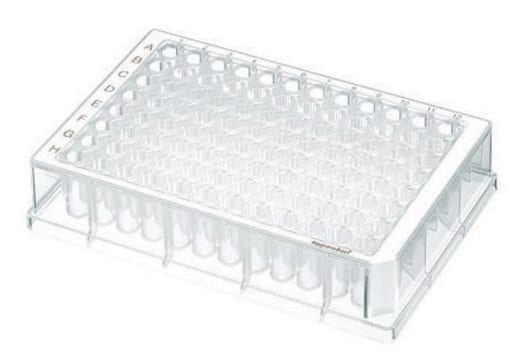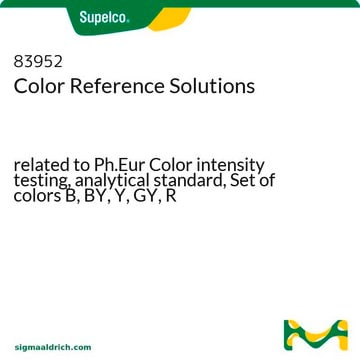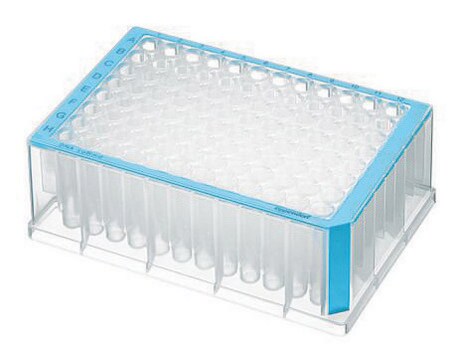EP951032000
Eppendorf® Deepwell plates, DNA LoBind, 96 wells
white plate, conical bottom, colorless wells, capacity 500 μL, pkg of 40 ea (5 bags × 8 plates)
Sign Into View Organizational & Contract Pricing
All Photos(1)
About This Item
UNSPSC Code:
41106300
Recommended Products
material
clear wells
colorless wells
conical bottom
polypropylene
white plate
sterility
non-sterile
feature
lid: no
packaging
pkg of 40 ea (5 bags × 8 plates)
manufacturer/tradename
Eppendorf® 951032000
capacity
500 μL
well volume
500 μL
color
white border
suitability
suitable for PCR
suitable for molecular biology
Looking for similar products? Visit Product Comparison Guide
Related Categories
General description
Deepwell Plate 96/500µL, DNA LoBind, wells clear, 500 µL, LoBind, PCR clean, white, 40 plates (5 bags × 8 plates)
- Eppendorf LoBind material ensures optimized sample recovery for improved assay results
- Free of surface coating (e.g. silicone) to minimize the risk of sample interference
- Lot-certified PCR clean purity grade: free of human DNA, DNase, RNase and PCR inhibitors
- Available in tube, microplate, and deepwell plate formats for easy-up scaling
- High-contrast Unique OptiTrack® matrix: up to 30 % faster sample identification and fewer pipetting errors
- RecoverMax well design: optimized well geometry for minimal remaining/dead volume and excellent mixing properties
- Raised well rims and a smooth surface ensure reliable sealing
Features and Benefits
- Eppendorf LoBind material ensures optimized sample recovery for improved assay results
- Free of surface coating (e.g. silicone) to minimize the risk of sample interference
- Lot-certified PCR clean purity grade: free of human DNA, DNase, RNase and PCR inhibitors
- Available in tube, microplate, and deepwell plate formats for easy-up scaling
- High-contrast Unique OptiTrack® matrix: up to 30 % faster sample identification and fewer pipetting errors
- RecoverMax® well design: optimized well geometry for minimal remaining/dead volume and excellent mixing properties
- Raised well rims and a smooth surface ensure reliable sealing
Legal Information
Eppendorf is a registered trademark of Eppendorf AG
OptiTrack is a registered trademark of Eppendorf AG
RecoverMax is a registered trademark of Eppendorf AG
Certificates of Analysis (COA)
Search for Certificates of Analysis (COA) by entering the products Lot/Batch Number. Lot and Batch Numbers can be found on a product’s label following the words ‘Lot’ or ‘Batch’.
Already Own This Product?
Find documentation for the products that you have recently purchased in the Document Library.
E I Trilisky et al.
Journal of chromatography. A, 1142(1), 2-12 (2007-01-24)
Purified viruses are used in gene therapy and vaccine production. Ion-exchange chromatography (IEC) is the most common method for large-scale downstream purification of viruses and proteins. Published IEC protocols provide details for specific separations but not general methods for selecting
Nikos Tsolakos et al.
Vaccine, 28(18), 3211-3218 (2010-03-02)
In this study, we evaluated the effect of the growth medium on the composition and immunogenicity of meningococcal outer membrane vesicle (OMV) vaccines after cultivation of the Norwegian serogroup B 44/76 vaccine strain in either Frantz' or modified Catlin-6 media
Sharon N Finger et al.
Nucleic acids research, 36(4), 1260-1272 (2008-01-05)
Telomerase is a ribonucleoprotein enzyme that maintains chromosome ends through de novo addition of telomeric DNA. The ability of telomerase to interact with its DNA substrate at sites outside its catalytic centre ('anchor sites') is important for its unique ability
M Yang et al.
International journal of pharmaceutics, 331(2), 176-181 (2006-11-28)
Salmon calcitonin (sCT) powders suitable for inhalation, containing chitosan and mannitol as absorption enhancer and protection agent, respectively, were prepared using a spray-drying process. The effect of chitosan on physicochemical stability of sCT in the dry powder was investigated by
Thandavarayan Kathiresan et al.
Methods in molecular biology (Clifton, N.J.), 493, 269-286 (2008-10-08)
Functional proteomics comprises a wide range of technologies for the identification of novel protein-protein interactions and biological markers. Studies of protein-protein interactions have gained from the development of techniques and technologies such as immunoprecipitation, preparative two-dimensional (2-D) gel electrophoresis for
Our team of scientists has experience in all areas of research including Life Science, Material Science, Chemical Synthesis, Chromatography, Analytical and many others.
Contact Technical Service